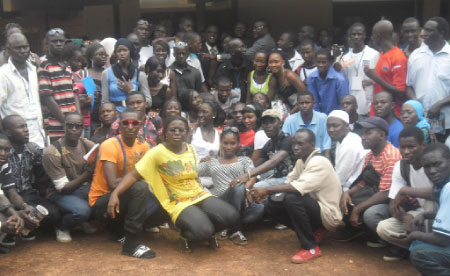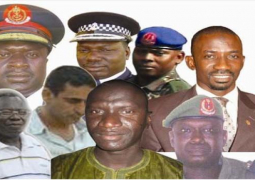
The Kansala Empire collapsed as a result of continued brutality against the Fulas, such as heavy taxation, which ignited the Fulas from Guinea Conakry to invade the Gabu to liberate the Fulas living in the Empire, says Ensa Touray, history lecturer,
He made this revelation at the end of a weeklong research visit to Guinea Bissau by history students of the
The students were in the West African country to research on the social, political and economic linkages that existed within Guinea Bissau, Senegal and The Gambia.
Mr Touray said they started their community research in the Kombo region where they discovered that the Bainunkas were the first settlers in the Kombo before the Bojang Jatta, who could not conquer the Bainunkas and had to seek military support from Gabu.
Kansala was the capital of Gabu and constituted more than thirty states, according to the researchers, who were able to understand that the seven-man kingdom from which the leaders were elected were all represented in Kansala as a seat of the government.
“We believe that many people wrote about Gabu but actually most of them talked about Gabu in its relation with other geo-political entities like
However, he said, most of the scholarly materials did not actually capture the detailed institutional structure of the governance system in Gabu.
“When we visited Kansala ruins, we were able to discover the existence of a representative governance system in Gabu as a greater geo-political entity,” Mr Touray said.
He said further that their research was very effective, which has reshaped the minds of the researchers on the political historiography of
He added that it also helped them to come up with a suggestion to task the governments of Guinea Bissau, Senegal and The Gambia to come together to protect the historical site, hence it is currently under human and natural threats.
“We also feel that all the ethnic groups in The Gambia have been studied in our educational system except the Manjagos and Bainunkas and we therefore deemed it prudent as a research institution to embark on research on an expanded area for the benefit of the people in The Gambia.”
He said the Manjagos were a centralised society with egalitarian outlaws and all those who suppose to succeed the throne in any of the Manjago settlements must be either maternally or paternally connected to the Babusing lineage.
He therefore stated that they can explore the historical memory and conditions to re-establish regional integration based on common defence and security within the sub-region.
He finally commended ActionAid, the Chancellor of the UTG, the Vice Chancellor and Dean of faculty of Art and Science of the UTG, and all those who sponsored their research trip to Guinea Bissau.
“The idea behind this research was to write comprehensively on Manjago history like any other ethnic groups so that our school-going children will know more about the Manjagos,” he said.
It was interesting to know that the Manjagos were the first settlers in Guinea Bissau; it was because of the Portuguese interference that the Manjagos scattered from Guinea Bissau to the Casamance and The Gambia,” said Kausu Drammeh, president of the history club.
He maintained that the research team will continue to take other scientific approaches to make deeper and important research in the academia.
Read Other Articles In Article (Archive)



